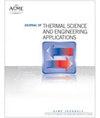利用汽车尾气余热的混合喷射式制冷系统能量与火用分析
IF 1.4
4区 工程技术
Q3 ENGINEERING, MECHANICAL
引用次数: 0
摘要
当前制冷和空调研究的一个主要焦点是能源使用和环境影响。基于喷射器的制冷系统是一种技术,希望在使用环保制冷剂的同时节省电力,以减少对自然的任何不利影响。减少对压缩机的依赖是本研究的首要和基本目标;二是演示用新型制冷剂R1234yf替代R134a在机动车空调系统中的应用,确定将R1234yf与混合空调系统结合使用的好处。在这种系统中,发动机的废气被用来操作喷射器。本文建立了一个数值模型,用于估算在指定主轴和主喷管出口位置的引射器夹带比。使用能量和火用分析的理论模型说明了混合动力系统在不同操作条件下(即发动机排气,环境空气和蒸发器温度)对性能的影响。在规定的排气温度下,对现有的R134a空调系统和R1234yf混合空调系统进行了详细的比较。研究发现,R1234yf混合动力系统将压缩机能耗降低44.43%,运行排气热量水平降低12.79%。COP提高41.42%,火用效率由37.14%降至13.85%。制冷量下降12.73%。基于R1234yf的混合空调系统在提高车载空调系统效率方面显示出巨大的潜力。本文章由计算机程序翻译,如有差异,请以英文原文为准。
Energy and Exergy Analysis of an Automobile Hybrid Ejector Refrigeration System Utilizing its Exhaust Waste Heat
A major current focus of refrigeration and air conditioning research is energy usage and environmental impact. The ejector-based refrigeration system is a technology that, it is hoped, can save power while using environment-friendly refrigerants to reduce any adverse effects on nature. The reduction of compressor dependency is the first and essential aim of this study; the second is to demonstrate the replacement of R134a with the new refrigerant R1234yf in motor vehicle air conditioning systems, establishing the benefits of employing R1234yf in conjunction with a Hybrid Air Conditioning System. In such a system the engine's exhaust gases are used to operate the ejector. A numerical model has been developed which estimates the ejector entrainment ratio at a specified spindle and primary nozzle exit position. A theoretical model using energy and exergy analysis illustrates the impact of hybrid systems on performance under different operating conditions (i.e., engine exhaust, ambient air, and evaporator temperatures). At a specified exhaust temperature, a detailed comparison has been conducted between a current air-conditioning system with R134a and the hybrid system with R1234yf. It was found that the R1234yf hybrid system reduced compressor energy consumption by 44.43% and operating exhaust heat levels by 12.79%. The COP was increased by 41.42%, while the exergetic efficiency was reduced from 37.14% to 13.85%. Cooling capacity dropped by 12.73%. The hybrid air-conditioning system based on R1234yf demonstrated tremendous potential for improving vehicle air-conditioning system efficiency.
求助全文
通过发布文献求助,成功后即可免费获取论文全文。
去求助
来源期刊

Journal of Thermal Science and Engineering Applications
THERMODYNAMICSENGINEERING, MECHANICAL -ENGINEERING, MECHANICAL
CiteScore
3.60
自引率
9.50%
发文量
120
期刊介绍:
Applications in: Aerospace systems; Gas turbines; Biotechnology; Defense systems; Electronic and photonic equipment; Energy systems; Manufacturing; Refrigeration and air conditioning; Homeland security systems; Micro- and nanoscale devices; Petrochemical processing; Medical systems; Energy efficiency; Sustainability; Solar systems; Combustion systems
 求助内容:
求助内容: 应助结果提醒方式:
应助结果提醒方式:


